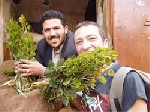 Lin Noueihed Reuters
Lin Noueihed Reuters - SANAA - Lunchtime in Sana'a. Offices begin to close, the crowds disappear from the ancient souqs, and restaurants hurry their last customers out: the qat is here.
The arrival of this mildly stimulant shrub by truck from the countryside heralds the end of the working day as Yemenis settle down to chew its leaves for the next four, six or even 10 hours.
On any given afternoon, many men sit, drive or walk the streets with a tennis ball-sized wad of qat in one cheek, looking at first glance like they desperately need a dentist.
Cramming a few choice pickings into his already bulging cheeks, driver Zayed Al Rehani, 28, swears by the stuff.
�It keeps me up 24 hours. If I am on night duty, it keeps me up,� he said, five hours into the eight-hour drive from Yemen�s southern port of Aden to the capital in the north. �I started when I was around 15 ... we grow it in my village.�
Qat, or catha edulis, has become the national pastime in this poor Arab country of 19 million, but one many experts say is ravaging Yemen�s frail economy and sucking up precious water.
Demand for qat is so high and Yemenis are so inclined to spend a large chunk of their paltry incomes on it that farmers are uprooting their fruits, vegetables and coffee in favour of the popular evergreen that provides year-round profit.
Qat production has grown by more than 41 percent to 147,444 tonnnes in the decade to 2006, according to official figures.
That makes qat Yemen�s biggest cash crop by far; just 22,002 tonnes of its nearest rival, cotton, were produced in 2006.
Already filling terraces across much of Yemen�s mountainous north, qat is now making inroads into the plains further south.
Running dry
�People say qat is the cause of Yemen�s problems but it is really a symptom ... like drug addiction in poor inner-city areas. People are very hard up here but qat makes things worse,� said one Western diplomat who declined to be named.
�You have to chew for a long time to get any effect so people close their businesses at 1:30 pm and come in late the next morning. Sana'a is running out of water and Yemen imports a lot of food because they mostly grow qat.�
Known for its fertile mountains in a desert peninsula, Yemen already faces water shortages, partly due to qat, and these are set to worsen as the population grows by over 3 percent a year.
With an estimated 70 percent of water in Yemen used to grow the thirsty plant, the Sana'a area will be dry by 2015, according to one official at the Agriculture and Irrigation Ministry.
Yemen relies on wells for fresh water, but farmers and authorities who once dug barely 50 metres to strike water say aquifers are so depleted they must now dig hundreds of metres.
�Qat is definitely a problem; there is no doubt about that,� said Minister for Economic Affairs Abdul-Karim Al Arhabi.
�Though it is not a drug as many believe, it has many harmful effects, especially when it takes up a major proportion of the family�s spending at the expense of food and schooling.�
Yemen is one of the poorest countries outside Africa, so people see in qat-chewing an escape from their tough lives and in qat-selling a source of much-needed income.
The Agriculture and Irrigation Ministry admits it long ignored the problem but has recently begun to distribute substitute crops for free and subsidies their irrigation. It is pushing to ban qat cultivation in some areas suited to grain.
Yet so intertwined has qat become in the social fabric of Yemen, that it has proven hard to weed out.
From peasants, who spend half their income on it, to politicians and businessmen, who say qat cements business deals the way golf does in the West, the plant pervades.
Force of habit
Yemenis will spend as much time defending the virtues of qat as they will chew it, emphatically denying it is a drug.
It wakes you up, makes you think clearly or makes life�s problems appear less insurmountable, they say.
Yemenis refer to �storing� rather than chewing qat, since they chew the leaves, swallow the potent juices, and then deposit the mush in their cheeks to help its absorption into the blood.
At �storing� sessions, men gather listening to music and discussing everything from politics, to work, to philosophy.
While not so long ago it was not socially acceptable for women to chew qat, many now hold their own sessions, although the crowded qat markets remain largely the domain of men.
Popping up around 11 in the morning and closing around two, when the last customers hurry off with their plastic bags full of shiny green stalks, these markets are busier than any others.
There is qat for every budget; quality and price range from $1 for shoddy stuff to reputedly over $100 for the best bundle.
There are virtually no bars or pubs, or even a cinema, in Sana'a. There are few pastimes and life very much centres around the home, adding to the popularity of qat, some Yemenis say.
�There is more demand for qat than there is for other goods and it is more widespread than anything else,� said qat-seller Rafik Ali. �I�ve never even tried selling anything else.�

